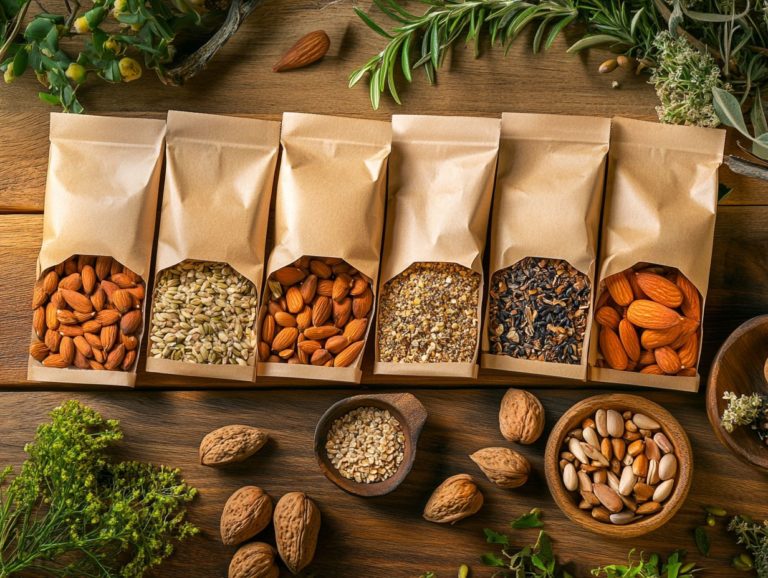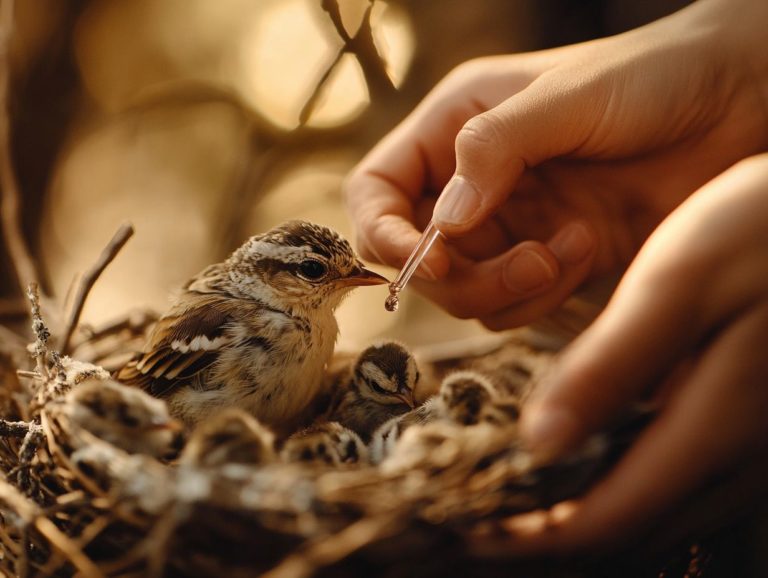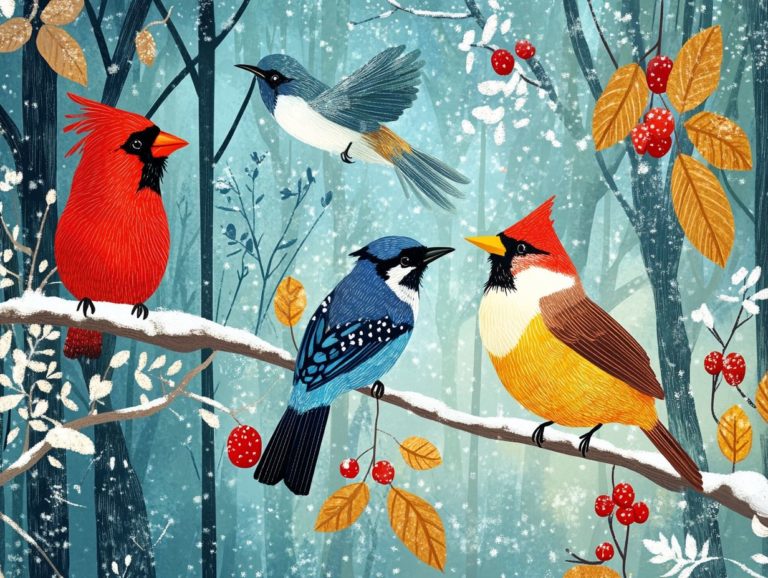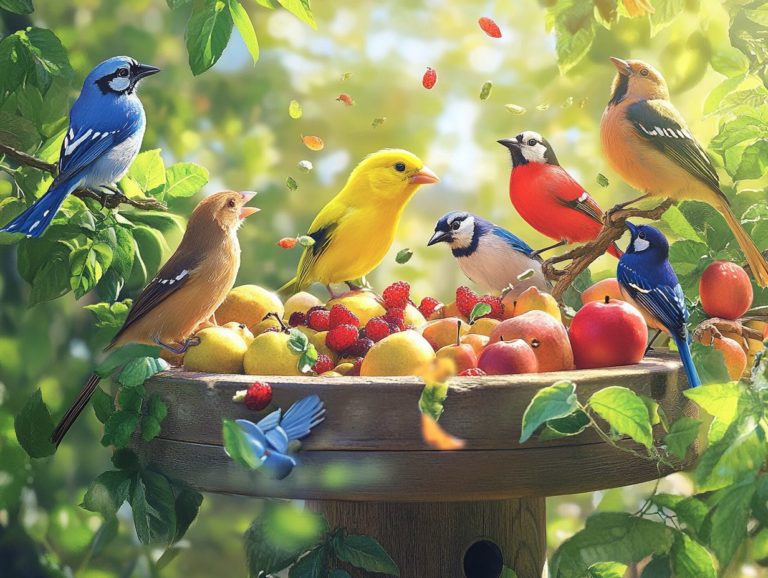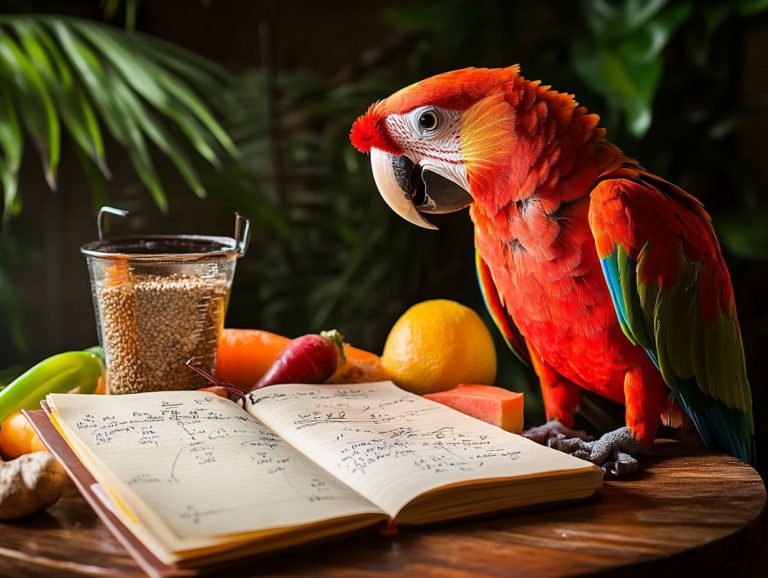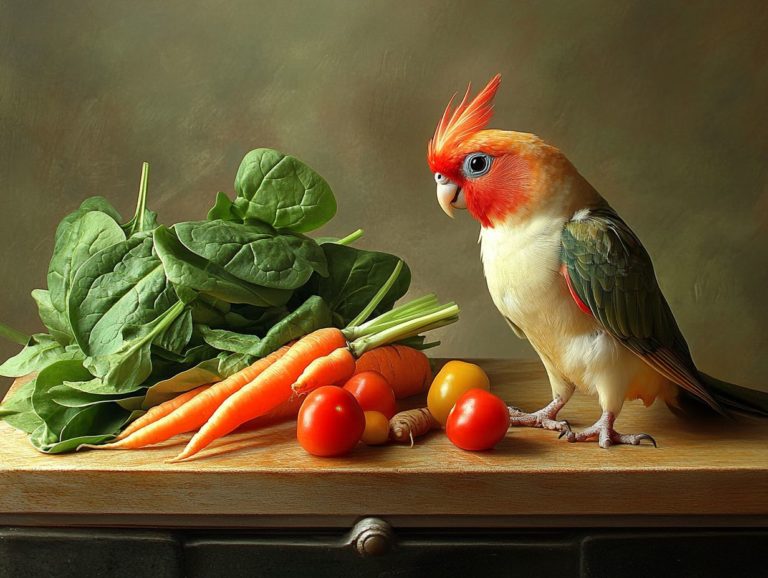Understanding Your Bird’s Dietary Habits
A balanced diet is essential for the health and well-being of your birds. Just like any living creature, they need vital nutrients to thrive. Understanding their dietary habits is pivotal for providing the right foods.
This article delves into the significance of a balanced diet, explores common food sources that nourish birds, identifies signs of nutritional deficiencies, and guides you in establishing a healthy feeding routine. It includes tips for different bird species, ensuring that your avian companions receive the care they truly deserve.
Discover how you can enhance their health and vitality through proper nutrition!
Contents
- Key Takeaways:
- Importance of a Balanced Diet for Birds
- Common Foods for Birds
- Signs of Nutritional Deficiencies in Birds
- Creating a Healthy Feeding Routine
- Special Considerations for Different Bird Species
- Frequently Asked Questions
- What is the importance of understanding my bird’s dietary habits?
- What are some common foods that should not be fed to my bird?
- How can I tell if my bird is not receiving the right nutrition?
- Do all birds have the same dietary needs?
- Can I feed my bird human food?
- Is it necessary to provide supplements or vitamins for my bird’s diet?
Key Takeaways:
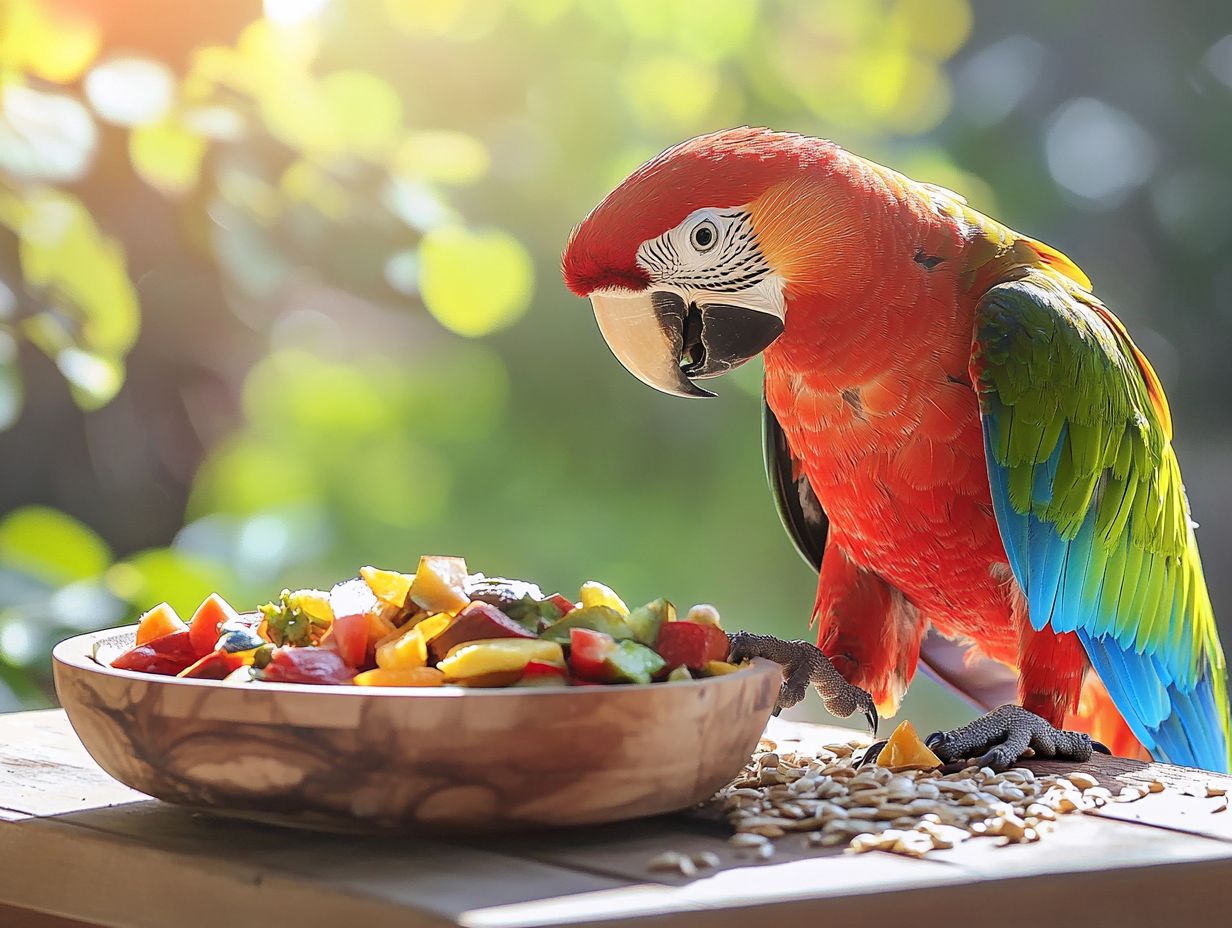
- A balanced diet is crucial for a bird’s overall health and well-being. It should include essential nutrients such as protein, carbohydrates, and vitamins.
- Birds should be fed a variety of foods including seeds, fruits, and vegetables to ensure they receive all the necessary nutrients for optimal health.
- Owners should be aware of signs of nutritional deficiencies in birds, such as feather plucking or weight loss. They must take action to address these issues through proper diet and supplementation.
Importance of a Balanced Diet for Birds
A balanced diet greatly affects birds’ health, reproductive success, and overall survival, whether in the wild or in domestic environments.
Every bird species, from eagles to sparrows to hummingbirds, has its own unique nutritional needs. Understanding these dietary needs is crucial, as it allows you to align your feeding practices with the specific requirements of each bird.
Knowing how to feed birds properly makes birdwatching even more enjoyable! This knowledge also plays a vital role in conservation efforts, supporting the maintenance of healthy bird populations and vibrant ecosystems.
Essential Nutrients for Optimal Health
For optimal health, birds need a diverse array of essential nutrients, including proteins, fats, vitamins, and minerals. These elements are crucial for their dietary habits and physical adaptations.
Take omnivorous birds, for example. These birds eat both plants and animals, allowing them to access important building blocks of proteins and vital fats for energy. Carnivorous birds, on the other hand, primarily eat other animals and flourish on nutrient-dense proteins and fatty acids from their prey, which are essential for muscle development and overall vitality.
Then there are herbivorous birds, like finches, that rely heavily on carbohydrates and fiber. This intake supports their digestive health and aligns perfectly with their unique beak structures adapted for seed consumption.
Grasping the specific nutritional needs of these various bird types is crucial, as it profoundly impacts their growth, feather health, and reproductive success.
Common Foods for Birds
Common foods for birds encompass a remarkable variety, including seeds, fruits, vegetables, and other sources tailored to the needs of different species, such as granivores and nectar-feeders.
For example, sparrows flourish on grains, while hummingbirds are irresistibly attracted to nectar-rich flowers. This diversity highlights the fascinating array of dietary preferences found among various bird types and their habitats.
Start feeding your birds the best diet today to see them thrive!
Seeds, Fruits, and Vegetables
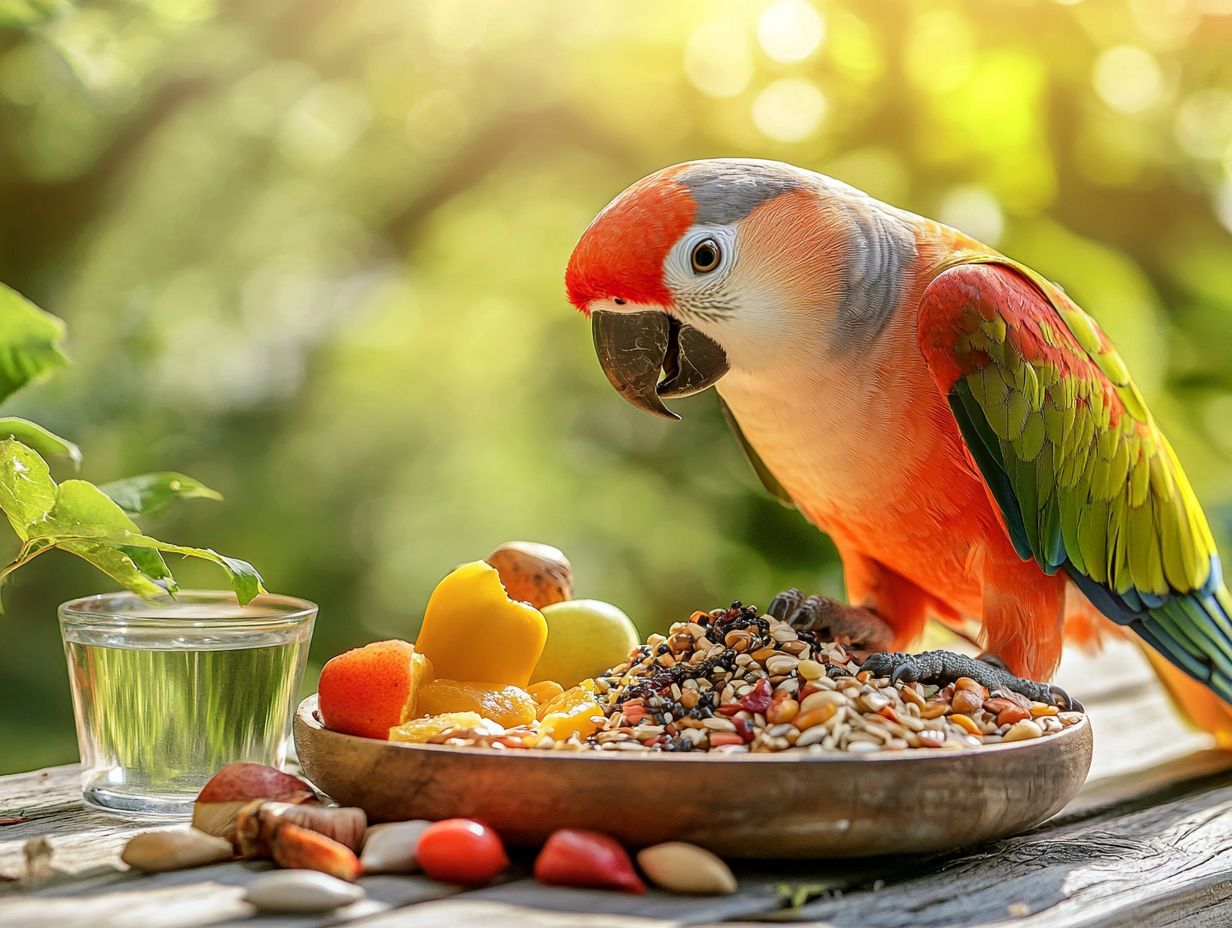
Seeds, fruits, and vegetables serve as staple food sources for many birds, providing important nutrients and energy essential for their survival and reproduction.
These foods come in a delightful variety, each offering unique benefits tailored to different bird species. For instance, small seeds like millet and sunflower are packed with fats and proteins, making them an excellent energy source for lively, active birds.
Fruits like berries and apples provide essential vitamins and hydration, crucial for maintaining healthy feathers and overall vitality.
Leafy greens and root vegetables provide important fiber and antioxidants, promoting effective digestion and bolstering immune functions. By understanding the dietary habits of these avian wonders, you can select the ideal food sources to attract a diverse array of species, ultimately enhancing their well-being.
Signs of Nutritional Deficiencies in Birds
Recognizing the signs of nutritional deficiencies in birds is essential for their health and well-being. These deficiencies can result in significant health complications and influence their overall behavior.
Key indicators to watch for include shifts in plumage, lethargy, and changes in feeding habits. Have you noticed changes in your bird’s behavior? This could be a sign of nutritional deficiency. By being attentive to these signs, both birdwatchers and pet owners can swiftly and effectively address any nutritional shortcomings, ensuring their feathered companions thrive.
Identifying and Addressing Deficiencies
Identifying and addressing deficiencies in a bird’s diet demands your keen observation and understanding of their specific nutritional needs. You might find that various pet care products can significantly enhance avian nutrition.
Start by monitoring their behavior, plumage condition, and overall energy levels these are often telling signs of nutritional imbalances. If you notice your feathered friend exhibiting symptoms like feather plucking or lethargy, it s time to explore new food options.
A balanced approach could include incorporating fortified pellets, which are specially formulated to provide essential nutrients, fresh fruits, vegetables, and the occasional seed.
Don t underestimate the importance of specialized supplements rich in vitamins and minerals; they can be vital in restoring that nutritional balance. Regular consultations with avian veterinarians can also provide you with tailored strategies to effectively manage and correct any dietary shortcomings.
Creating a Healthy Feeding Routine
Establishing a healthy feeding routine for birds is crucial to ensure they receive the right nutrients and maintain their overall health, particularly as environments and seasonal diets change.
By implementing best practices for feeding such as providing a diverse mix of seeds, fruits, and specialized diets you can significantly enhance their dietary habits and overall well-being.
Best Practices for Feeding Birds
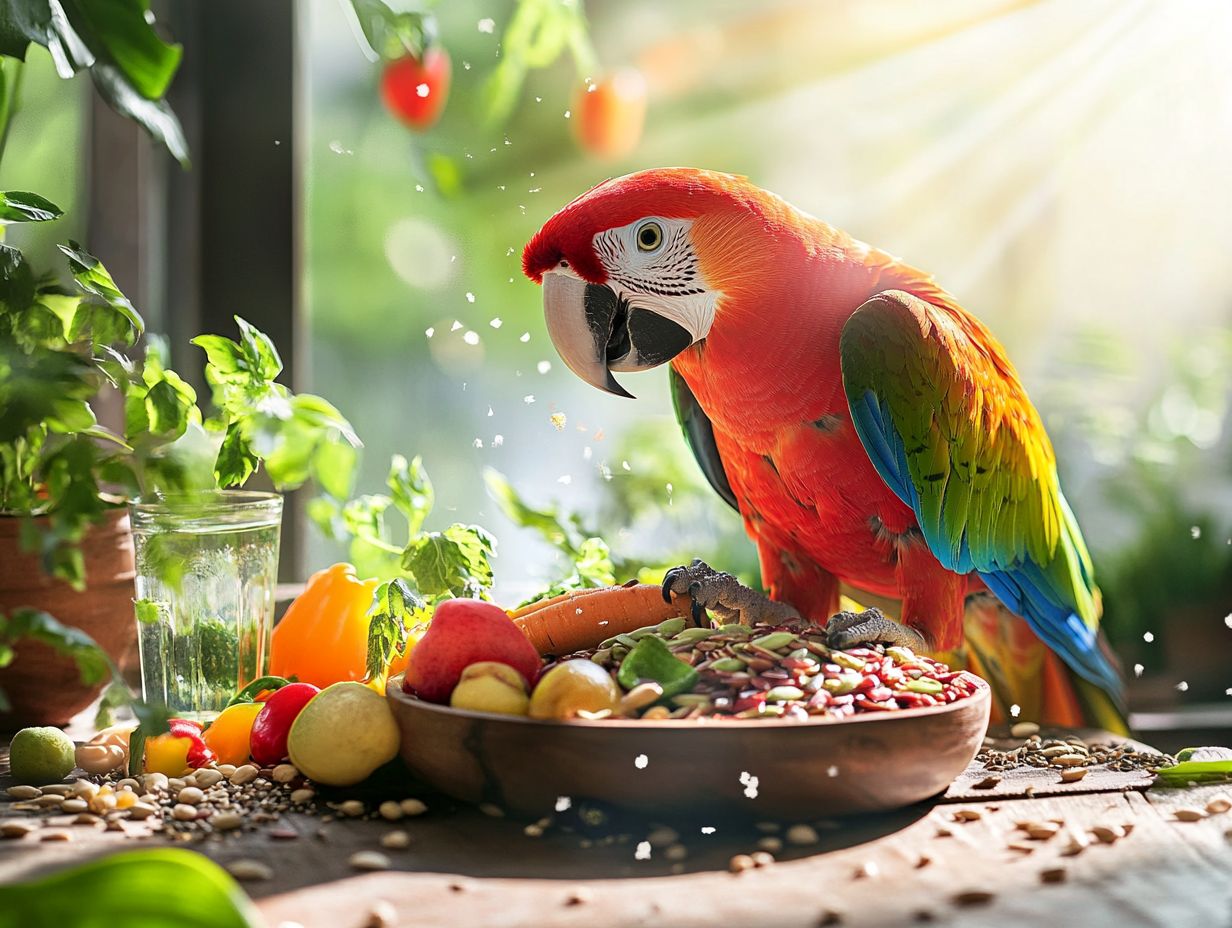
To create the best environment for feeding birds, it’s essential for you to understand their specific dietary preferences and ensure that food is available year-round to support healthy populations of different types of birds.
By offering a diverse array of foods think seeds, suet, and nectar you can attract various species like nectar-feeding birds and meet their unique needs. Regularly refilling your feeders, especially during the early morning and late afternoon, will maximize feeding opportunities.
Adding fresh fruits and vegetables can further diversify their diet, catering to the nutritional requirements of both migratory and resident birds.
Paying close attention to seasonal changes is crucial, as some bird species have dietary preferences that shift throughout the year.
Special Considerations for Different Bird Species
Regarding feeding different bird species, it’s essential to recognize their unique dietary needs. Each species, from the fish-loving kingfisher to the nectar-sipping hummingbird, has a specialized diet that profoundly impacts its health and behavior.
By understanding these dietary distinctions, you can enhance your birdwatching experience and contribute meaningfully to conservation efforts.
Dietary Needs for Different Types of Birds
Dietary needs for birds vary significantly across species, encompassing categories like omnivores, carnivores, herbivores, insectivores, and seed-eating birds. Each of these groups requires specially tailored food sources to thrive.
Knowing these differences is key to keeping your birds healthy and happy! Seed-eating birds primarily indulge in seeds and grains, thriving on a diet abundant in carbohydrates and fats. Insectivores need a regular supply of insects and worms for their protein requirements.
Carnivorous birds, such as eagles and hawks, need regular access to meat, which is crucial for maintaining their energy levels and supporting their physiological functions.
Herbivorous species, meanwhile, flourish on a diverse array of fruits and vegetables, ensuring they receive vital vitamins and minerals for their activity and reproductive health. By catering to these varied dietary preferences, you not only support their growth and energy but also contribute to a balanced ecosystem.
Frequently Asked Questions
What is the importance of understanding my bird’s dietary habits?
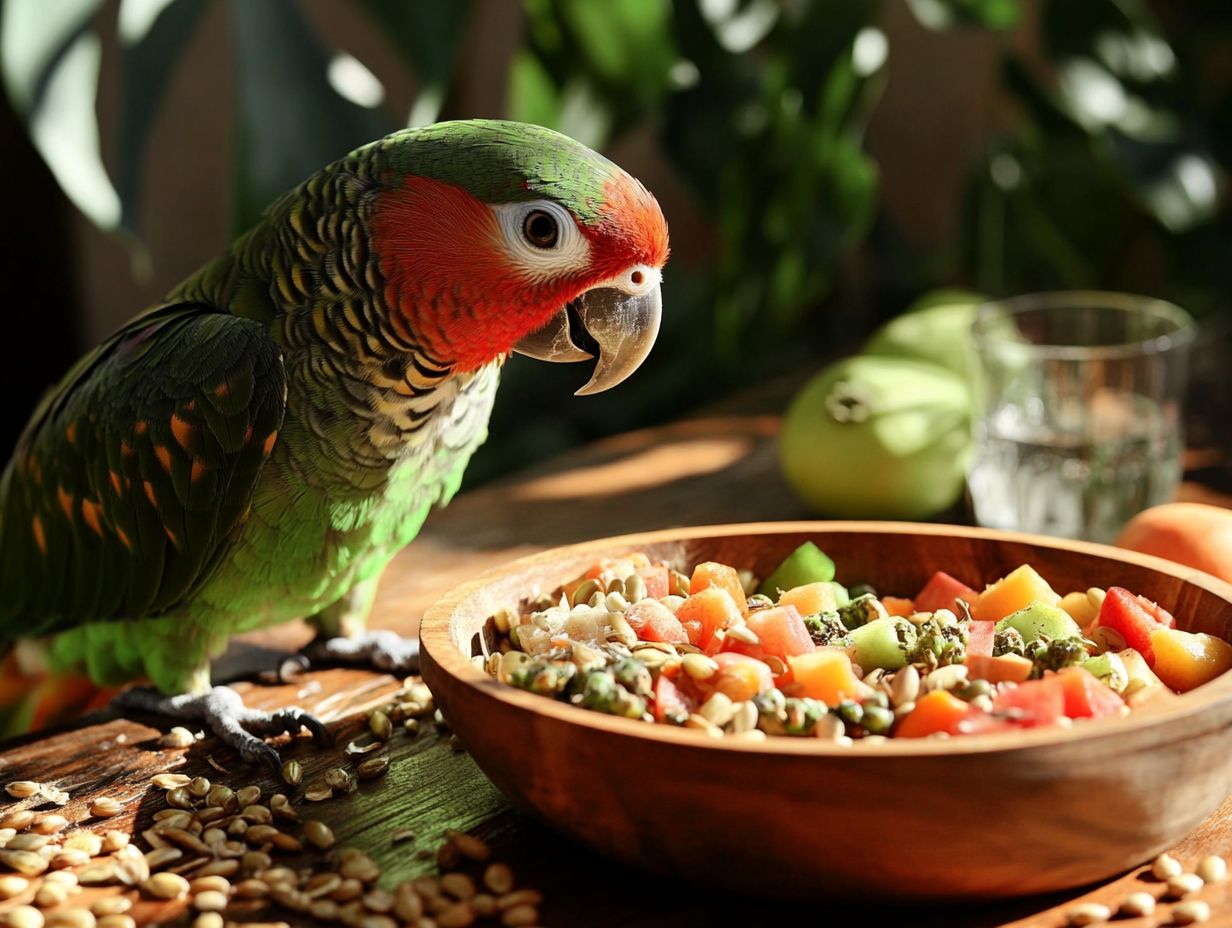
Understanding your bird’s dietary habits is crucial for their overall health and well-being. For more insights, understanding the nutritional needs of parrots can help prevent various health issues and promote a longer lifespan for your feathered friend.
What are some common foods that should not be fed to my bird?
Several foods are toxic to birds, including avocados, chocolate, caffeine, and alcohol. Researching is vital, and consulting with a veterinarian ensures you provide safe and nutritious foods for your bird.
How can I tell if my bird is not receiving the right nutrition?
Signs that may indicate your bird is not receiving proper nutrition include changes in feather appearance, weight loss, excessive sneezing or discharge, and lack of energy. If you notice any of these signs, consult with a veterinarian to assess your bird’s diet.
Do all birds have the same dietary needs?
No, different species of birds have varying dietary requirements. Some may require more protein, while others may need more fruits and vegetables. It is important to research and understand your specific bird’s dietary needs.
Can I feed my bird human food?
Some human foods can be safe for birds, such as fresh fruits and vegetables, cooked grains, and lean proteins. However, avoid giving your bird processed or high-fat foods, as well as foods with added sugars and salt.
Is it necessary to provide supplements or vitamins for my bird’s diet?
In most cases, a balanced and varied diet should provide all the necessary nutrients for your bird. However, if your bird has specific health conditions or is not eating a well-rounded diet, your veterinarian may recommend supplements or vitamins to ensure they get all the necessary nutrients.
Take charge of your bird’s health today by learning what they need to thrive!

